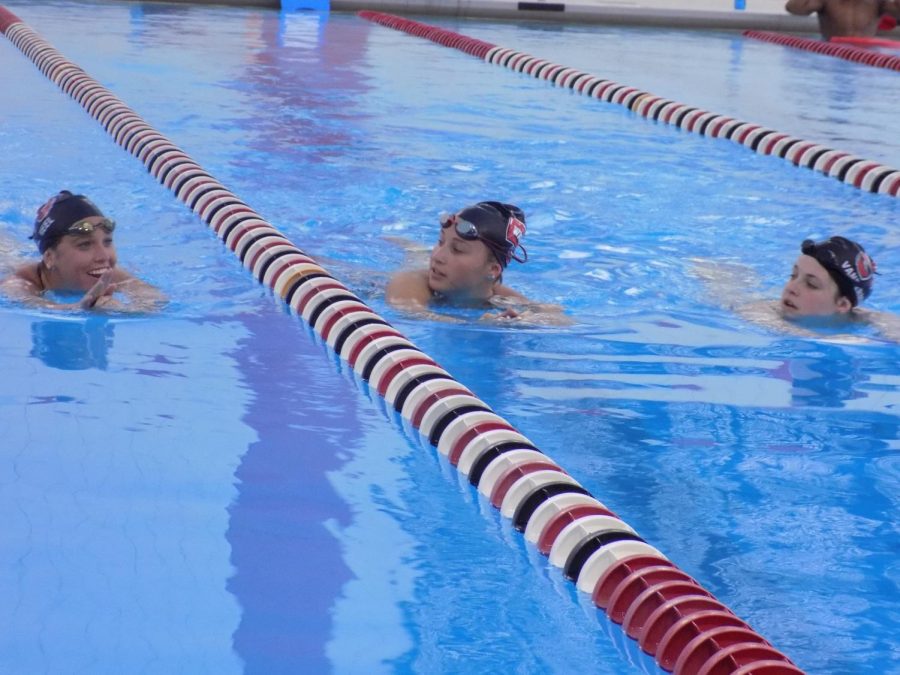Taking a New Lap: Record-holding swimmer faces uncertain future
May 5, 2015
Mollie McNeel, 21, and another member of the WKU women’s swim team arrives at Preston fitness center before 1 p.m. for swim practice, eager to begin. They waste no time getting their swimsuits on.
McNeel doctors her healing tattoo, three letters vertically stacked against her left breast, representing the team she has considered family for two and a half years.
The team that once had 50-plus members now hardly resembles its former self as few slowly file in, each commenting on how long it’s been since their last practice, or how recruiting at alternative universities is going.
Many quit, giving up the sport altogether. Others are too busy looking for new universities for which to compete. Everyone is struggling to finish the semester with decent grades.
“We’re not supposed to get tattoos when we are in the water a lot, but I did it anyways,” McNeel said, as she layers salve on the peeling skin.
She said many of the girls have gotten the same tattoo, while others are waiting until summer break. It is their way of remembering the team that is now disbanded.
Western Kentucky University President Gary Ransdell and Athletic Director Todd Stewart suspended the swimming and diving team for the next five years. The move follows a Title IX investigation, spurred by a freshman’s letter to the university detailing hazing and abuse by team members.
Now a decision needs to be made by the members: continue their studies at WKU without swimming, or transfer. Either choice could hold serious consequences.
McNeel worries that transferring credits could be tricky with majors in environmental science and public relations.
“I have a double major, so with transferring credits, [I] could lose almost a year of work,” she says.
McNeel is trying to move forward, weighing her options before making a sudden decision. She is certain of one thing: swimming, a passion that has existed as long as she can remember.
THE STARTING LINE
Her love of swimming began 16 years ago, at the age of five. McNeel remembers going to the pool, where she plunged into the water without a care and sank straight to the bottom. Locking eyes with her mother, who stood at the pool’s edge, immediately worried for her daughter’s safety, they both understood this was the discovery of a passion.
Swimming lessons soon followed at the YMCA, and McNeel discovered she had a natural skill. She passed intermediate levels, from guppy to minnow, and had even been offered a spot in pre-lifeguard training. But McNeel had a thirst for competing and around 6 years of age, Patrick Rowan became her swim coach.
Now an assistant coach at the University of Nebraska since 2012, Rowan worked for the YMCA in the early 2000s. He was McNeel’s club coach for nearly seven years. McNeel says they basically grew up together in the world of swimming.
Her nickname was “Bull’s Eye,” Rowan says. He brags that even from a young age, she was dedicated to training and reaching her goals.
“She enjoyed the challenge of putting herself up against the best,” he said.
For McNeel, routine set in, a busy schedule for a child of six. Wake at 4 a.m. Swim practice at 5 a.m. Practice for two hours. School at 8 a.m. She notes that without the support of her mother who was her mode of transportation, she would not have been able to pursue her interest, and for that she is thankful.
By age 12, McNeel had eyes on her biggest challenge yet, a timed regionals meet. Each event has a time limit that must be met in order to continue. With 400 athletes present, McNeel was the youngest competitor at the meet. On Saturday, she swam the 1,000-yard, which takes just under 11 minutes.
“I missed it by one second,” she says. “I was devastated because I wanted this so bad.”
Determined, she returned on Sunday and swam the mile event, this time making the cut.
WKU teammate Kennedy Higdon, 23, says the mile is still McNeel’s best event.
“The mile is one of the hardest events in swimming,” Higdon says. “It takes a very dedicated person to compete in the mile. They must be disciplined, resilient, and very hard-working. Mollie definitely embodies all of those things.”
The routine only became more hectic as meets required farther travel, harder and longer practices, all while attending school.
“Outside the pool she stayed busy whether it was academics, student counsel, teaching kids how to swim, or a number of other activities,” Rowan says. “Mollie never settles for average.”
The busy schedule wasn’t all positive for McNeel. She recalls missing out on football games and social events throughout her teenage years. One specific instance, McNeel recalls, is a school dance she helped plan. The dance, however, was accidentally planned on the same day as a big swim meet. McNeel missed the dance in order to compete.
“I’ve always been a competitive person,” she admits. “It’s who I am, it’s my identity. I’ve just always swam.”
The harder competitions started after being recruited into Western Kentucky University’s swim program in the fall of 2012. McNeel was 19 at the time, 14 hours away from her home in Nebraska. She knew no one.
Her first night alone, the head coach of the team held a barbeque at his home, inviting the existing team along with its newest arrivals. After the cookout, the upperclassmen took the recruits out for ice cream. She says it made her feel welcome. Since then, she has considered these people her “family.”
Higdon agrees. “This team made it so easy for me to transfer here because we all support each other so much,” she says. “The support system here really is amazing and unique.”
The family McNeel formed among her team and coaches are her inspiration, she says.
“You’re tired, you have this horrible test coming up, your boyfriend is yelling at you. And you’re like, ‘I don’t want to be here,’” she says, “But your teammates are like, ‘Hey, come on. It could be worse. You got to focus, stay positive.”
Another inspiration was the scoreboard hanging in the Preston pool auditorium, listing WKU’s women’s swimming records.
“For three years, I looked at that board,” McNeel says. She told herself her name would be up there one day.
In the spring of 2015, McNeel placed third in conference in the mile, missing the lead time by two seconds. It was a bittersweet victory for McNeel, who never expected to place third; yet, to swim nearly 17 minutes and miss your mark by two seconds is devastating, she says.
Shortly after conference in the early spring semester of 2015, McNeel was presented with a second chance at the National Invite Tournament (NIT). This was an opportunity for those who did well to continue competing, and for those who did poorly to improve their times.
FOR THE LOVE OF THE POOL
Competing meant rigorous training and missing spring break. Instead of relaxing on a beach, she focused on training.
“I’ve never been on spring break,” McNeel admitted.
Brian Thomas, her distance coach at WKU, is the one she sought advice from about the opportunity to continue competing at the NIT.
She says he flatly told her that her time had gotten worse by almost 20 seconds. She says he told her she couldn’t recover in a month’s time, but then challenged her to prove him wrong. She accepted.
“Mollie has a bit of a stubborn streak,” Rowan says of his former athlete, “which was normally good because she never quit on things when she made her mind up.”
Training started immediately.
“I swam really, really bad,” she says, blushing. And she says she didn’t improve, even up to the time of the meet. There were 12 team members total that made the flight to Rockwall, Texas to the NIT.
McNeel remembers being very nervous, more so at this meet than others. Her coach was at another competition, so she phoned him before her time to compete. Thomas assured her it was nothing to worry about, she says.
She took a breath, adjusted her goggles and cap, and took those last steps to the edge of the pool. Focusing on what was at hand, she plunged into the water.
“I hit the wall and looked up and saw my time, and I literally just started crying,” McNeel recalls. “I’ve never cried at a swim meet.” Her time was 16:40.7; a new school record by one second.
Yet, her name will never be on the board she stared at during practice each day and night. The achievement she earned will never be embodied as many others before her, because she says there is no one to put her name up there. The Title IX investigation began in the beginning of 2015, but the decision to suspend both teams came down at the end of April, after McNeel’s trip to Texas.
Practice is no longer mandatory, and members are free to make their own decisions about where to go from here. McNeel isn’t ready to give up.
“I love doing this, and I’m not ready to let it go the way that it did. I want to go out on my own terms. I’ve been doing this for 16 years, I’m not just going to let someone be like ‘you’re done.’”
Though there are no team meets ahead for the dismembered WKU swim team, McNeel is at practice doing laps and various exercises that the sprint coach, Kevin Knezevich, has written up and shouts at them over the 80s rock music blaring through the auditorium.
There are 10 lanes in the pool at Preston where the team trains. Both McNeel and Knezevich say that before the suspension, there could be up to five people in a lane. Today, each person has their own, with one lane abandoned.
It’s the last week of the semester, and practices are coming to an end. The people she has grown to call family are going separate ways. Everyone exits the pools and dries off. They gather by the bleachers and discuss pictures and social media on their phones while they stretch out their beaten muscles.
McNeel slowly rises to gather her things for class. Standing to the side and watching her teammates, she takes in the scene she knows will soon be a fond yet sad memory. This is one of the moments she says she will miss the most.






















![Megan Inman of Tennessee cries after embracing Drag performer and transgender advocate Jasmine St. James at the 9th Annual WKU Housing and Residence Life Drag Show at Knicely Conference Center on April 4, 2024. “[The community] was so warm and welcoming when I came out, if it wasn’t for the queens I wouldn’t be here,” Inman said.](https://wkuherald.com/wp-content/uploads/2024/04/smith_von_drag_3-600x419.jpg)


